Item 2: Cortez Consulting Slide Deck Part 1 — original pdf
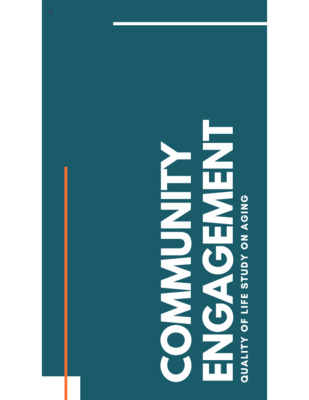
Backup

Backup
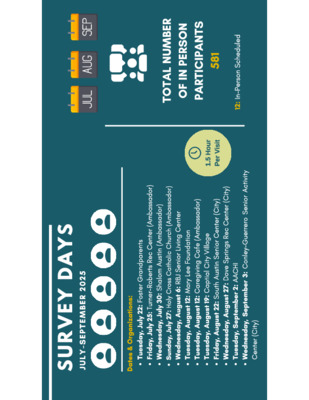
Backup
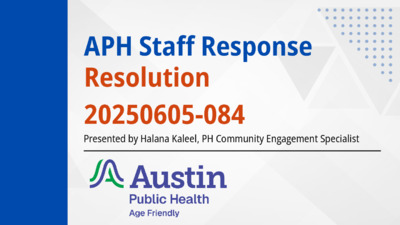
APH Staff Response Resolution 20250605-084 Presented by Halana Kaleel, PH Community Engagement Specialist Resolution 20250605-084: Age-Friendly Austin Adopted on June 5th, 2025 by Austin City Council, this resolution directs the City to enhance resources and programming for older adults. Austin Public Health is leading the response and progress will be reported out at the October 9th, 2025 City Council meeting. Resolution Directives: • Assigning a point of contact in each City • Exploring reimbursement options for in- Department home care • Prioritizing new senior centers and • Securing additional funding for home • programming Improving transportation options for older adults • delivered meals Implementing key recommendations from the 2022 audit City Services for Older Adults • Developing fraud prevention initiatives • Exploring the feasibility of an older adult internship or volunteer program Resolution 20250605-084: Resolution 20250605-084: Age-Friendly Austin Key Progress and Initiatives City Staff has made progress on several fronts: • Improved Communication: The Austin Senior Services Hub was launched in November 2023 to centralize resources for older adults. Austin Public Health is also conducting "Listen and Learn" sessions to help city departments better engage with seniors. • Action Plan Update: The Age Friendly Action Plan (AFAP) is being amended to include clearer metrics and responsibilities, with a new 2026-2030 plan scheduled for completion in July 2026. • Community Partnerships: The City is partnering with organizations like Meals on Wheels, Family Eldercare, and the Austin Geriatric Center to provide home-delivered meals, financial literacy services, and culturally responsive in-home care. • Fraud Prevention: The Austin Police Department is planning a Seniors Fraud Awareness Month for March 2026 and is working with partners to distribute educational materials. Resolution 20250605-084: Age-Friendly Austin Senior Centers and Programming There is a focus on expanding both space and programs available to older adults: • New Senior Center: Austin Parks and Recreation (APR) has identified Northeast Austin as a priority for a new senior center. The Gus Garcia Recreation Center Senior Wing project has been proposed, with community engagement underway for a potential 2026 bond program. • Intergenerational Programs: In Fiscal Year 2025, APR hosted 153 multigenerational events and programs, including family yoga and activities at community gardens. • Current Funding: APR currently allocates over $2.8 million for senior services across six different budgets. Resolution 20250605-084: Age-Friendly Austin Critical Resource and Staffing Needs While progress has been made, several key initiatives require identifying funding to move forward …
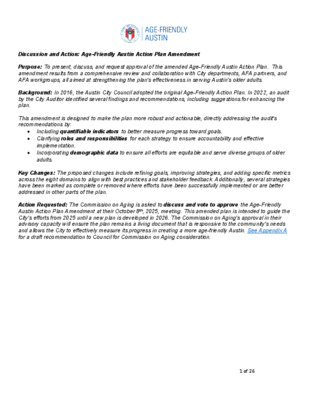
Discussion and Action: Age-Friendly Austin Action Plan Amendment Purpose: To present, discuss, and request approval of the amended Age-Friendly Austin Action Plan. This amendment results from a comprehensive review and collaboration with City departments, AFA partners, and AFA workgroups, all aimed at strengthening the plan's effectiveness in serving Austin's older adults. Background: In 2016, the Austin City Council adopted the original Age-Friendly Action Plan. In 2022, an audit by the City Auditor identified several findings and recommendations, including suggestions for enhancing the plan. This amendment is designed to make the plan more robust and actionable, directly addressing the audit's recommendations by: Including quantifiable indicators to better measure progress toward goals. • • Clarifying roles and responsibilities for each strategy to ensure accountability and effective • implementation. Incorporating demographic data to ensure all efforts are equitable and serve diverse groups of older adults. Key Changes: The proposed changes include refining goals, improving strategies, and adding specific metrics across the eight domains to align with best practices and stakeholder feedback. Additionally, several strategies have been marked as complete or removed where efforts have been successfully implemented or are better addressed in other parts of the plan. Action Requested: The Commission on Aging is asked to discuss and vote to approve the Age-Friendly Austin Action Plan Amendment at their October 8th, 2025, meeting. This amended plan is intended to guide the City's efforts from 2025 until a new plan is developed in 2026. The Commission on Aging’s approval in their advisory capacity will ensure the plan remains a living document that is responsive to the community's needs and allows the City to effectively measure its progress in creating a more age-friendly Austin. See Appendix A for a draft recommendation to Council for Commission on Aging consideration. 1 of 26 Age-Friendly Austin Action Plan Amendment Last Updated: September 2025 History of Age Friendly Austin Action Plan In 2012 the Mayor's Task Force on Aging was formed by Mayor Lee Leffingwell. In their final report published in 2013 the task force recommended that Austin be designated as an Age Friendly Community under AARP. The task force recommended the formation of the Commission on Seniors (now the Commission on Aging) to serve as an advisory committee to make recommendations on programs and policies to City Council, the City Manager, to City Departments, and to be advocates for issues that impact older adults. In 2015 the Commission …
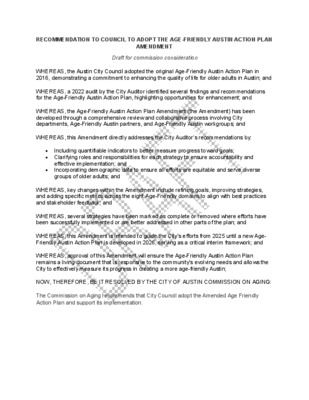
RECOMMENDATION TO COUNCIL TO ADOPT THE AGE-FRIENDLY AUSTIN ACTION PLAN AMENDMENT Draft for commission consideration WHEREAS, the Austin City Council adopted the original Age-Friendly Austin Action Plan in 2016, demonstrating a commitment to enhancing the quality of life for older adults in Austin; and WHEREAS, a 2022 audit by the City Auditor identified several findings and recommendations for the Age-Friendly Austin Action Plan, highlighting opportunities for enhancement; and WHEREAS, the Age-Friendly Austin Action Plan Amendment (the Amendment) has been developed through a comprehensive review and collaborative process involving City departments, Age-Friendly Austin partners, and Age-Friendly Austin workgroups; and WHEREAS, this Amendment directly addresses the City Auditor’s recommendations by: Including quantifiable indicators to better measure progress toward goals; • • Clarifying roles and responsibilities for each strategy to ensure accountability and • effective implementation; and Incorporating demographic data to ensure all efforts are equitable and serve diverse groups of older adults; and WHEREAS, key changes within the Amendment include refining goals, improving strategies, and adding specific metrics across the eight Age-Friendly domains to align with best practices and stakeholder feedback; and WHEREAS, several strategies have been marked as complete or removed where efforts have been successfully implemented or are better addressed in other parts of the plan; and WHEREAS, this Amendment is intended to guide the City's efforts from 2025 until a new Age- Friendly Austin Action Plan is developed in 2026, serving as a critical interim framework; and WHEREAS, approval of this Amendment will ensure the Age-Friendly Austin Action Plan remains a living document that is responsive to the community's evolving needs and allows the City to effectively measure its progress in creating a more age-friendly Austin; NOW, THEREFORE, BE IT RESOLVED BY THE CITY OF AUSTIN COMMISSION ON AGING: The Commission on Aging recommends that City Council adopt the Amended Age Friendly Action Plan and support its implementation.
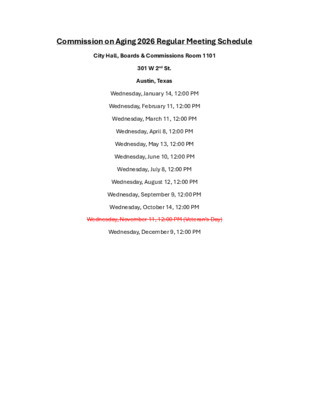
Commission on Aging 2026 Regular Meeting Schedule City Hall, Boards & Commissions Room 1101 301 W 2nd St. Austin, Texas Wednesday, January 14, 12:00 PM Wednesday, February 11, 12:00 PM Wednesday, March 11, 12:00 PM Wednesday, April 8, 12:00 PM Wednesday, May 13, 12:00 PM Wednesday, June 10, 12:00 PM Wednesday, July 8, 12:00 PM Wednesday, August 12, 12:00 PM Wednesday, September 9, 12:00 PM Wednesday, October 14, 12:00 PM Wednesday, November 11, 12:00 PM (Veteran’s Day) Wednesday, December 9, 12:00 PM
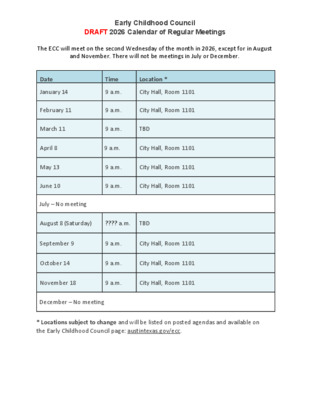
Early Childhood Council DRAFT 2026 Calendar of Regular Meetings The ECC will meet on the second Wednesday of the month in 2026, except for in August and November. There will not be meetings in July or December. Date Time Location * January 14 9 a.m. City Hall, Room 1101 February 11 9 a.m. City Hall, Room 1101 March 11 9 a.m. TBD April 8 9 a.m. City Hall, Room 1101 May 13 June 10 9 a.m. City Hall, Room 1101 9 a.m. City Hall, Room 1101 July – No meeting August 8 (Saturday) ???? a.m. TBD September 9 9 a.m. City Hall, Room 1101 October 14 9 a.m. City Hall, Room 1101 November 18 9 a.m. City Hall, Room 1101 December – No meeting * Locations subject to change and will be listed on posted agendas and available on the Early Childhood Council page: austintexas.gov/ecc.

PRESENTATION TITLE OF A FEW WORDS PreK Partnerships: A Premium Shared Service Denisse Baldwin Associate Vice President Early Learning Advancement ‹#› Key Components of PK Partnerships • District co-enrolls PK eligible students at high-quality childcare centers • District receives a percentage of the Average Daily Attendance (ADA) funds generated • Childcare centers receive the rest of the ADA generated by co-enrolled students ‹#›12 Full Day = 420 min (7 hrs) Child care center hours 7:00am - 6:00pm (11 hrs) • Full-day PK4 is required • PK3 is not required • eligible PK students only generate ½ day PK Eligibility 1. Cannot speak/comprehend English language 2. Low-income (NSLP) 3. Homeless 4. Military - active 5. Military - veteran 6. DFPS/Foster Care 7. STAR Award 8. Teacher in the district employed PK student generates $3,250 per year if 100% attendance PreK Partnerships 7:00-8:00 8:00-3:00 Full Day = 420 min (7 hrs) Child care center hours 7:00am - 6:00pm (11 hrs) • 80% ADA Generated • Child Care Subsidy (if eligible) • Parent Tuition or Parent 3:00-6:00 Share of Cost ELAC - Shared Services What is a Shared Services Alliance? Our goal is to improve operational stability and service quality in all participating centers by centralizing business and pedagogical leadership. BENEFITS OF JOINING • Spend less time and money on all resources • Improve quality through coaching and Professional Development • Access Navigation & Virtual Assistant Director Support • Achieve Iron Triangle metrics: ⚬ Full Enrollment ⚬ Full Fee Collection ⚬ Revenue Covers Cost per Child ELAC - Shared Services PARTNERS & RESOURCES ELAC - Shared Services PARTNERS & RESOURCES • Annual cost savings tracked per provider • On the job training for teachers and administration • Tracking hours of time saved with navigation, clerical, and virtual assistant director support Both locations North & South locations 10 RRISD PARTNER SITES DISTRICT PARTNERS 20 AISD PARTNER SITES Global Kids Preschool All three locations! ELAC-PreK Partnerships 80% Average Daily Attendance passed through to TRS 3 & 4 Star Centers providing high quality PreK! A PREMIUM SHARED SERVICE PreK 3 & PreK 4 PreK 3 23-24 $684,097 $63,487 $747,584 24-25 $629,175 $103,953 $733,128 Over $100,000 passed into hands of teachers in 24-25 • Registration & co-enrollment support ⚬ PreLAS testing ⚬ PK eligibility verification • Instructional coaching • Ongoing professional development • Family Engagement support • Access to all Shared Services Meet the Team Aaron De …
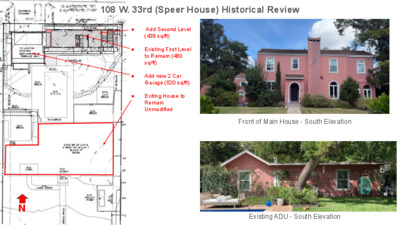
108 W. 33rd (Speer House) Historical Review ● ● ● ● Add Second Level (438 sq/ft) Existing First Level to Remain (480 sq/ft) Add new 2 Car Garage (520 sq/ft) Exiting House to Remain Unmodified Front of Main House - South Elevation N Existing ADU - South Elevation Rear Elevation (North) ● ● ● Adding 2nd Floor Adding Garage Existing 1st story to remain Front Elevation (South) ● ● ● Adding 2nd Floor Adding Garage Existing 1st story to remain Side Elevations Additional Photos The Ocie Speer House 108 West 33rd Street ● This City of Austin historic landmark was built in the early 1920s. It was designed by noted Austin architect Edwin Clinton Kreisle and is distinguished by its Spanish Colonial Revival architectural style and for several significant occupants who were outstanding in the fields of law and education. The property is within the North University NCCD-NP and is listed as a contributing structure within the Aldridge Place Local Historic District. ● The accessory apartment structure at the north edge of the property was permitted and built in the 1970s, has no architectural significance and is in need of major repair and maintenance. ● We propose to modify the first level of the existing accessory building for a pool room with storage and to add a second level apartment, along with a one-story adjacent Garage. The Garage opens to West 34th Street which bounds the property on the north. Many houses on this block are a full-block deep and well over half of the houses have accessory buildings, many two- story with garages facing West 34th Street. ● Our design approach is to use a stucco exterior similar to the main house. We propose a low-pitched hipped roof to reduce visual impact of the new second level. Our design goal is to create an understated form that complements the historic main house yet does not detract from the main house.
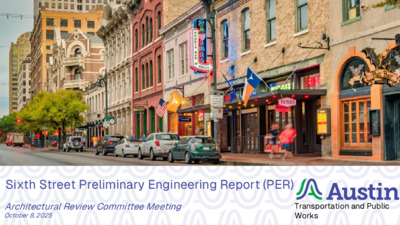
Sixth Street Preliminary Engineering Report (PER) Architectural Review Committee Meeting October 8, 2025 Transportation and Public Works Recap of 6th Street PER • Study Area: 6th Street (IH-35 to Congress Avenue). • Purpose: Identify transportation and mobility improvements to form the long-term vision for the street. • Goal: Develop a set (1) of recommended improvements with their associated costs. • ACT Plan: 3 Options. • Schedule: Conclude PER by end of 2025; begin design in 2026; construction in 2027, pending 2026 Bond Election. • Completed to Date: Survey, Subsurface Utility Exploration, Preliminary Layout of Options Project Limits Map Alternative 1 Alternative 1 Alternative 2 Alternative 2 Alternative 3 Alternative 3 Comparison Matrix Next Steps *Stakeholder meeting #1 occurred in June 2025. THANK YOU!
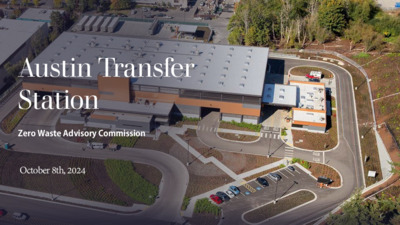
Austin Transfer Station Zero Waste Advisory Commission October 8th, 2024 What Is A Transfer Station? • A facility where solid waste is temporarily collected, sorted, and consolidated before being transferred to larger vehicles for transportation to a landfill, recycling facility, or other final disposal site. Transfer Station Benefits • Reduces GHG emissions • Supports Electrifying Fleet • Provides public disposal opportunities & • Increases storm readiness & operations resiliency • Reduces ARR & City operating expenses reduces blight • Supports City’s Climate Equity Plan • Expands diversion & disposal • Supports ARR Comprehensive Plan opportunities Financial Analysis Factors Consultant reviewed several categories of expenses to evaluate benefit of building a transfer station opposed to direct hauling to disposal facility. Metric Routes Measurement Number of routes eliminated Personnel Reduction in staffing or overtime Vehicles Savings on trucks, fuel, and tolls Construction Capital costs to develop facility including fixed equipment Operating Costs Costs to operate the facility including all personnel costs Site Evaluation Factors • Site Conditions • Operational Cost Efficiency • Potential for Permitting Concerns • Impact on Surrounding Community • Utility Access • Value of Land Parcel • Environmental Justice • Compatibility with CAPCOG Plan • Ease of Vehicle Accessibility • Collection Rate Efficiency The financial viability of a transfer station is largely determined by its proximity to both the new dispatch location at the Northeast Service Center (NESC) and the collection service areas…. Sites…east of I-35 in the north-central and northeast areas are likely to offer stronger financial returns compared to other parts of the City.” - Consultant’s Report Recycle Facility Waste Facility Brush Facility ARR Service Center Compost Facility Sites Evaluated Seattle North Transfer Station Financial Results • Constructing and operating a transfer station would result in an annual cost of approximately $20,000 - $992,000 compared to direct hauling waste prior to accounting for additional revenue from private (non- City) haulers • Breakeven with acceptance of private hauler waste Next Steps September 10, 2025 February 2026 2030 Zero Waste Advisory Commission (ZWAC) Briefing CWEP & ZWAC update on Transfer Station including potential Development Agreement Beginning of FY 2030 Estimated Commencement of Operations City Council Authorization for Property Acquisition City Council Authorization for Development Agreement Fall 2025 Spring 2026 Questions? Richard McHale Director – Austin Resource Recovery 512-974-4301 Richard.McHale@austintexas.gov www.austinrecycles.com

P44h╞� x ouEX╞^ x ko╨ ¯č ¯Ą╞+ ªÓš ╞◊¥╞� ÚËÓª—╞ *◊—¶ ╞h‰◊∙ ◊Ëî À u CEXP ╞* E? ╞ʼn ╞ + ^ RR� * ^ k � u EÉ4 Rally Austin is the first multi-purpose local government corporation, requested by the community and created by the Austin City Council in October 2020 Community driven, Equity focused Designed to be agile, mission-driven, collaborative and flexible Bring new financial tools and resources to the table and generate consistent revenues Professional approach to community investment and project delivery ¯ WEo o E^ X Facilitating equitable development for economic growth while preserving Austin's unique culture. ÉEo E^ X A culturally resilient and economically integrated Austin where diverse communities thrive without risk of displacement. R™î ¶ ª—µ╞ª—¸ ™ËÓ– ™—ÓË╞ª—╞◊Ú‰╞ ° ◊– – Ú—ªÓš╤╞î Ë╞î ╞° ◊– – Ú—ªÓš ╞ Rally will focus its efforts to unite and drive progress across three critical areas of development in Central Texas: � kuo╤╞Wx oE+ ╞ʼn╞+ x Rux k4 + ^ WhR4u4╞+ ^ WWx XEuE4o╞ + � u� Rä uE+ ╞0 4É4R^ hW4Xu · ^ x k ╞+ ^ WWx XEu ä ╞ � u ╞Ñ ^ k P Board of Directors Collaboration of community leaders and nominating bodies who represent local organizations and asset holders. Ñ C^ ╞Ñ 4╞� k 4 Ă � + u EÉ4╞+ ^ WWx XEu ä ╞ EXÉ4o u W4Xu o Real estate projects valued at approximately $160M, securing an estimated 293,000 square feet of affordable space: 180,000 SF Affordable housing 86,000 SF Cultural spaces 14,000 SF Commercial spaces 13,000 SF Outdoor and shared spaces Collective economic impact projected between $320 to $400M, also providing community benefits: Job creation and tax revenues Property value increases Tourism and cultural preservation Soul and vitality ^ x k ╞k � RRä ╞>^ k + ^ WhR4u4╞ + ^ WWx XEuE4o ^ x k ╞k � RRä ╞>^ k � kuo╤╞Wx oE+ ╞ʼn╞ + x Rux k 4 ^ x k ╞k � RRä ╞>^ k + � u� Rä uE+ ╞ 0 4É4R^ hW4Xu Mixed-use development Seven real estate Rally moves large-scale, for Blocks 16 & 18 on development projects multi-million-dollar East 11th Street in the valued at $37.5M with an development and African American estimated $75M-$94M infrastructure projects Cultural Heritage District, return on investment. and serves as a flexible building thriving small This area …
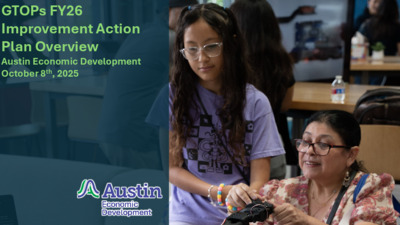
GTOPs FY26 Improvement Action Plan Overview Austin Economic Development October 8th, 2025 Item 1 - Review Process Updates Discontinuation of Review Binder Grant portal issues and application length delayed printing of binders in 2025. A replacement option will be offered for review panelists to keep track of their notes and comments. Enhanced oversight of Q+A GTOPs staff will assist with scheduling of Q+A cohorts/sessions and sit in on panel meetings due to issues with panelists coordinating these sessions themselves. Application Review Tutorial In an effort to assist panelists and increase the quality of reviews, staff will create a walkthrough doc or video on how to review an application and best practices for review panelists. Item 2 – GTOPs Application Process Discontinuation of Office Hours GTOPs Office Hours were not utilized by our community, we will no longer host these pre- scheduled sessions. But we will make ourselves as available as possible for 1:1 assistance with applicants. Mini and Capacity Timeline Change Delays in GTOPS Core led to decreased bandwidth for Mini and Capacity pathways. Timelines will be adjusted to all begin in January. Alignment of timelines will increase focus and streamline processes. Spanish language assist for Cap + Mini GTOPs staff provides Spanish language assistance for Core applicants, as required by AED. Cap and Mini will adopt this policy and implement. Item 2 – GTOPs Application Process COA Vendor Registration Requirement 2025 saw delays in contracting due to awardees not having previously registered as a city vendor. This requirement will be enforced and one of the required application fields will request the applicant City vendor code. Set GTOPs Protest Window To avoid delays incurred by the protest process, a one- week window will be set for applicants to submit a GTOPs decision protest. Another week will be reserved for the adjudication process. Enhancements to the GTOPS applicant guide The applicant guide will be updated to reflect changes or highlight key items; boilerplate is required reading, read fundable/non- fundable items list, AI use guidelines, PIR notice, no PMs for Capacity Item 3 – Performance Reporting Updates Item 4 – Contracting Process Streamlining Guidance on performance reporting for GTOPS Mini GTOPs Mini awardees and applicants have historically struggled with creating and keeping up with performance measure requirements for this program. GTOPs staff will overhaul the process by creating a guide on Mini reporting and create a standardized and detailed template. Consolidation of …
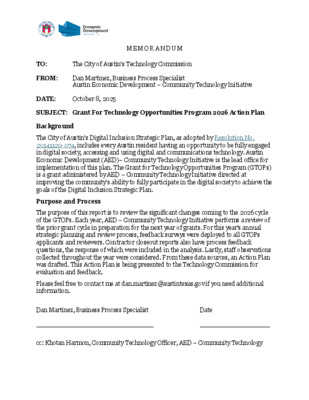
M E M O R A N D U M TO: The City of Austin’s Technology Commission FROM: Dan Martinez, Business Process Specialist Austin Economic Development – Community Technology Initiative DATE: October 8, 2025 SUBJECT: Grant For Technology Opportunities Program 2026 Action Plan Background The City of Austin’s Digital Inclusion Strategic Plan, as adopted by Resolution No. 20141120-074, includes every Austin resident having an opportunity to be fully engaged in digital society, accessing and using digital and communications technology. Austin Economic Development (AED)– Community Technology Initiative is the lead office for implementation of this plan. The Grant for Technology Opportunities Program (GTOPs) is a grant administered by AED – Community Technology Initiative directed at improving the community's ability to fully participate in the digital society to achieve the goals of the Digital Inclusion Strategic Plan. Purpose and Process The purpose of this report is to review the significant changes coming to the 2026 cycle of the GTOPs. Each year, AED – Community Technology Initiative performs a review of the prior grant cycle in preparation for the next year of grants. For this year’s annual strategic planning and review process, feedback surveys were deployed to all GTOPs applicants and reviewers. Contractor closeout reports also have process feedback questions, the response of which were included in the analysis. Lastly, staff observations collected throughout the year were considered. From these data sources, an Action Plan was drafted. This Action Plan is being presented to the Technology Commission for evaluation and feedback. Please feel free to contact me at dan.martinez@austintexas.gov if you need additional information. Dan Martinez, Business Process Specialist Date ______________________________ __________________ cc: Khotan Harmon, Community Technology Officer, AED – Community Technology Attachments Attachment A – GTOPs 2026 Action Plan Attachment A: GTOPs 2026 Action Plan Action Item 1: Enhancements to the GTOPs Review Process 1. Discontinuation of the Grant Review Binder: Traditionally, GTOPs Core review panelists are offered the option to have all application materials compiled into a physical review binder. Some panelists prefer to have a physical version to more easily read and keep notes on. This past cycle, issues with the grant application portal and the increased length of application materials led to extensive delays in compiling and printing these binders. GTOPs staff recommends replacing this binder with a staff designed note taking document and digital compilation of all application materials. 2. GTOPs Staff Enhanced Oversight of Q+A Proccess: Efforts …
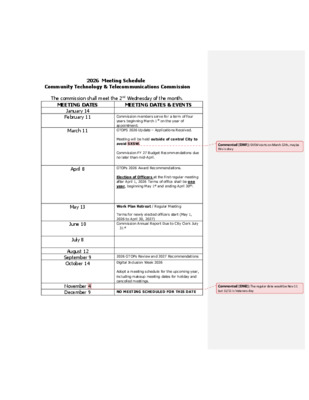
2026 Meeting Schedule Community Technology & Telecommunications Commission The commission shall meet the 2nd Wednesday of the month. MEETING DATES January 14 February 11 March 11 MEETING DATES & EVENTS Commission members serve for a term of four years beginning March 1st on the year of appointment. GTOPS 2026 Update – Applications Received. Meeting will be held outside of central City to avoid SXSW. Commission FY 27 Budget Recommendations due no later than mid-April. April 8 GTOPs 2026 Award Recommendations. Election of Officers at the first regular meeting after April 1, 2026 Terms of office shall be one year, beginning May 1st and ending April 30th. May 13 June 10 July 8 August 12 September 9 October 14 November 4 December 9 Work Plan Retreat / Regular Meeting Terms for newly elected officers start (May 1, 2026 to April 30, 2027) Commission Annual Report Due to City Clerk July 31st 2026 GTOPs Review and 2027 Recommendations Digital Inclusion Week 2026 Adopt a meeting schedule for the upcoming year, including makeup meeting dates for holiday and cancelled meetings. NO MEETING SCHEDULED FOR THIS DATE Commented [DM1]: SXSW starts on March 12th, maybe this is okay Commented [DM2]: The regular date would be Nov 11 but 11/11 is Veterans day
Play audio
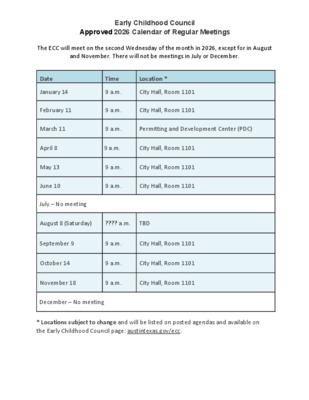
Early Childhood Council Approved 2026 Calendar of Regular Meetings The ECC will meet on the second Wednesday of the month in 2026, except for in August and November. There will not be meetings in July or December. Date Time Location * January 14 9 a.m. City Hall, Room 1101 February 11 9 a.m. City Hall, Room 1101 March 11 9 a.m. Permitting and Development Center (PDC) April 8 9 a.m. City Hall, Room 1101 May 13 June 10 9 a.m. City Hall, Room 1101 9 a.m. City Hall, Room 1101 July – No meeting August 8 (Saturday) ???? a.m. TBD September 9 9 a.m. City Hall, Room 1101 October 14 9 a.m. City Hall, Room 1101 November 18 9 a.m. City Hall, Room 1101 December – No meeting * Locations subject to change and will be listed on posted agendas and available on the Early Childhood Council page: austintexas.gov/ecc.
Play video
Play audio
Play video